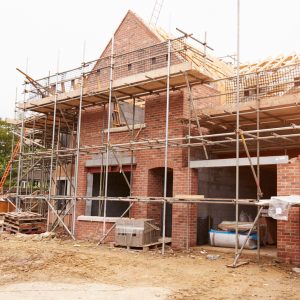
Earlier this week the Home Builders Federation (HBF) revealed that fewer than 2,500 housing projects were granted planning permission in the second quarter of the year. That’s down by 20 per cent on a year ago, and the lowest number since records began back in 2006.
The HBF cautioned this could lead to new record lows in house building levels.
Brokers suggested that the planning system is ripe for reform in order to boost housebuilding levels, and called on the government to raise its game in order to produce more new homes.
Wait and see
Stephen Perkins, managing director of Yellow Brick Mortgages, said that developers had faced issues not only with obtaining planning permission but also dealing with higher construction costs. And that was on top of house prices and demand both dropping following the end of Help to Buy.
He continued: “Unsurprisingly in light of this, most are slowing or pausing the building of new homes and potentially sitting on land banks and sites until market conditions are more favourable.”
Weak leadership
The government has been the “epitome of failure” on housebuilding, argued Samuel Mather-Holgate, independent financial adviser at Mather and Murray Financial, who noted that the housebuilding targets had been scrapped because “they knew they were going to miss them by an embarrassing margin”.
He continued: “Housebuilders are crying out for planning reform. One after the other, as they released their annual statements there was a cacophony of criticism of the government planning regime. Weak leadership has let this continue for too long, and the poorest are paying the price.”
The difference between big and small developers
Sebastian Riemann, director of Virtus Private Finance, said that there is a distinct difference between smaller developers and the very large housebuilders.
While all have been impacted by a host of challenges, such as rising costs of materials and labour as well as the pandemic, larger firms have been better placed to deal with them since they can simply put off development until they are profitable again. However smaller developers don’t have that luxury, with some looking to offload.
Boosting affordable housing
He added that there is a need for at least a cap on profits on some developments in order to ensure there is good, affordable housebuilding. “It may be that the government would be best placed to be the housebuilder themselves. There should also be a focus on sustainable house building, where the services around these larger rural developments are integrated from the outset.”
Riemann added that some limit on who can own the new properties would ensure the right markets are supported. “It could be quite easy to restrict sales to ensure that the properties are not allowed to be let or that the new homes can only be purchased by UK residents or nationals, including those with permanent rights for example. This is quite common in other parts of the world.”
Graham Cox, founder of Self Employed Mortgage Hub, suggested that the government’s strategy around housing was mistaken, and called for a return to building social housing at scale.
He added: “The process for getting planning permission to build new developments needs a massive overhaul. It’s incredibly slow and holding the country back.”
Charles Breen, founder of Montgomery Financial, said that relaxing planning laws and allowing councils to become developers would make a real difference.
He explained: “In the post-war building boom councils were allowed to buy farmland, rezone it as residential and then instruct the builders what to build and when. But they effectively banned this from happening, putting all the control with private builders who hoard land.”
Breen argued that allowing councils to buy agricultural land and rezone it, would “spur on development and stop large developers from restricting supply to artificially inflate prices which they currently are doing”.
Martin Stewart, director of London Money, noted that developers were “finding their feet” in the post Help to Buy world, which he suggested shows how “bloated the scheme made housebuilders’ accounts.”
He continued: “There will be a degree of land banking now from builders, they won’t want to commit a shovel in the ground if it means selling into a buyers’ market. A lot will be looking toward the Autumn Statement to see if the Chancellor can once again reunite the rabbit with the hat.”
BTL takes some of the blame too
Stewart suggested that housing targets are only one thread in “the tangled mess of UK property”.
He continued: “The restricted supply has also been created by the equally bloated buy-to-let sector which has done far more to remove property from the supply chain than many other aspects. “
Why not replace Help to Buy?
The fact that Help to Buy simply came to an end, without some form of replacement was also criticised by brokers.
Mather-Holgate said that not replacing the scheme with something else to support those of low incomes was “deplorable”, arguing that the government simply didn’t care about the housing crisis.
Government has central role to play
Riemann argued that the government has to be “instrumental” in shaping the future housing in the UK.
He continued: “We can draw on the example of the cladding scandal where profit was put ahead of safety. I would like to see the government tackle this problem head on and start making some significant policy changes to future proof the country’s housing stock.”
Cox also suggested that the government should review how it approaches tax when it comes to developments.
He explained: “Higher taxes for developers who land bank should be brought in, whilst providing tax breaks to build eco homes. And finally, include property prices in the two per cent inflation target, to make them more affordable to buy.”
Some views cited in this piece were sourced from Newspage















